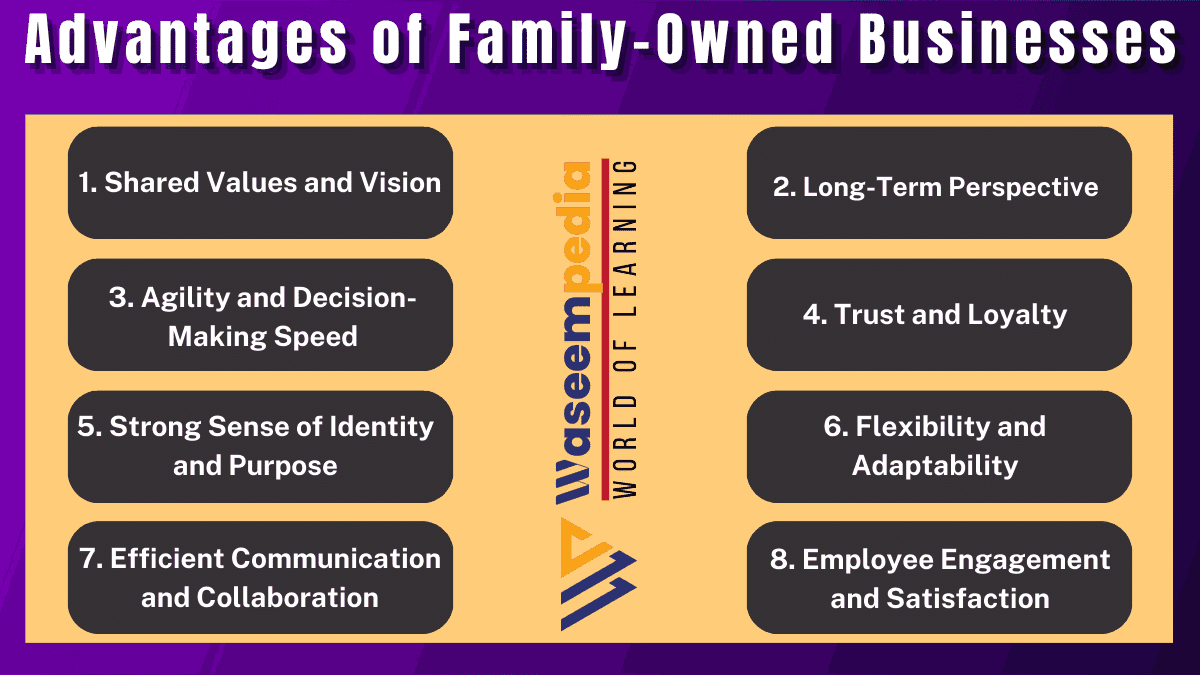Family-owned businesses have a long-standing tradition and have been an integral part of the global economy for centuries. These businesses, often spanning multiple generations, offer unique advantages that contribute to their success and resilience. In this article, we will explore the advantages of family-owned businesses, including shared values, long-term perspective, agility, trust, and a strong sense of identity.

Family-owned businesses play a significant role in the global economy, contributing to job creation, economic growth, and community development. These businesses possess unique advantages that set them apart from other types of enterprises. Let’s delve into the advantages of businesses of family-owned and understand why they continue to thrive.
9 Advantages of Family-Owned Businesses
There are many advantages of of Family-Owned Businesses but 9 Advantages of Family-Owned Businesses are as following.
1. Shared Values and Vision
One of the key advantages of family-owned businesses is the shared values and vision among family members. The family bond fosters a strong sense of unity and a common purpose, creating a cohesive work environment. This shared vision translates into a consistent company culture, a strong commitment to quality and customer satisfaction, and a deep-rooted passion for the business’s success.
2. Long-Term Perspective
Family-owned businesses often adopt a long-term perspective in their decision-making. Instead of focusing solely on short-term gains, these businesses prioritize sustainable growth and the well-being of future generations. This long-term approach allows family-owned businesses to make strategic investments, build enduring relationships, and weather economic downturns with resilience.
3. Agility and Decision-Making Speed
Family-owned businesses have the advantage of agility and quick decision-making. The absence of complex hierarchies and bureaucratic processes enables swift action and adaptability. Family members can make informed decisions promptly, taking advantage of emerging opportunities or addressing challenges promptly. This agility allows family-owned businesses to respond effectively to market changes and maintain a competitive edge.
4. Trust and Loyalty
Trust and loyalty are inherent advantages of family-owned businesses. The deep-rooted familial bonds foster a high level of trust among family members, leading to transparent communication and reliable partnerships. This trust extends to employees, suppliers, and customers, creating a strong foundation for long-term relationships and business success. The loyalty of family members and employees often translates into a strong commitment to the business’s values and objectives.
5. Strong Sense of Identity and Purpose
Family-owned businesses often have a strong sense of identity and purpose. The business represents the family’s legacy and heritage, instilling a deep sense of pride and responsibility. This strong identity fuels a collective drive for success, motivating family members to preserve the business’s reputation and ensure its long-term sustainability. The sense of purpose also attracts employees who align with the company’s values and mission.
6. Flexibility and Adaptability
Family-owned businesses possess the flexibility and adaptability to navigate changing market dynamics. Being closely connected to the day-to-day operations, family members can readily identify emerging trends, customer preferences, and industry shifts. This awareness allows them to implement necessary changes swiftly, adjust strategies, and seize new opportunities. The ability to adapt quickly is a crucial advantage in today’s rapidly evolving business landscape.
7. Efficient Communication and Collaboration
Efficient communication and collaboration are inherent strengths of family-owned businesses. The familiarity among family members promotes open and direct communication channels, facilitating decision-making, problem-solving, and conflict resolution. This efficient communication leads to faster execution of strategies, improved coordination, and a more cohesive work environment.
8. Employee Engagement and Satisfaction
Family-owned businesses often prioritize the well-being of their employees, creating a positive work environment that promotes engagement and job satisfaction. The familial atmosphere fosters a sense of belonging and camaraderie, encouraging employees to take ownership of their roles and contribute to the business’s success. Additionally, family members often serve as role models, inspiring employees to grow professionally and personally.
9. Community Impact and Legacy
Family-owned businesses have a significant impact on their communities. They often contribute to local economies by creating job opportunities and supporting local suppliers and vendors. Additionally, family-owned businesses frequently engage in philanthropic activities, giving back to the communities that have supported them. This community impact further strengthens the business’s reputation and legacy.
Family-owned businesses bring a host of advantages that contribute to their long-term success and resilience. From shared values and vision to a long-term perspective, agility, trust, and a strong sense of identity, these businesses continue to thrive in an ever-changing business landscape. By leveraging their unique strengths and capitalizing on the familial bonds, family-owned businesses create a legacy that extends beyond financial success, leaving a lasting impact on their employees, communities, and future generations.
Related FAQ’s
What are advantages and disadvantages of family business?
Family businesses have several advantages, including strong family bonds that can foster trust and loyalty, a long-term perspective, and flexibility in decision-making. However, they also face disadvantages such as potential conflicts within the family, difficulties in professionalizing the business, and succession challenges when transitioning to the next generation.
What are the advantages of family business going public?
The advantages of a family business going public include access to greater capital, increased liquidity for shareholders, and the ability to diversify ownership and share the financial burden with a wider group of investors.
Why do people like family owned businesses?
People often prefer family-owned businesses because they perceive them as having a personal touch, strong commitment to quality and customer service, and a sense of community and tradition, which can lead to greater trust and loyalty.
What are the qualities of a family owned business?
Qualities of a family-owned business typically include strong family bonds, a sense of tradition and legacy, personalized customer service, and a long-term perspective on business success.
What is the role of family owned business?
The role of a family-owned business is to combine family values and business objectives to create a unique blend of culture, legacy, and entrepreneurial success, often with a focus on long-term sustainability and family cohesion.

